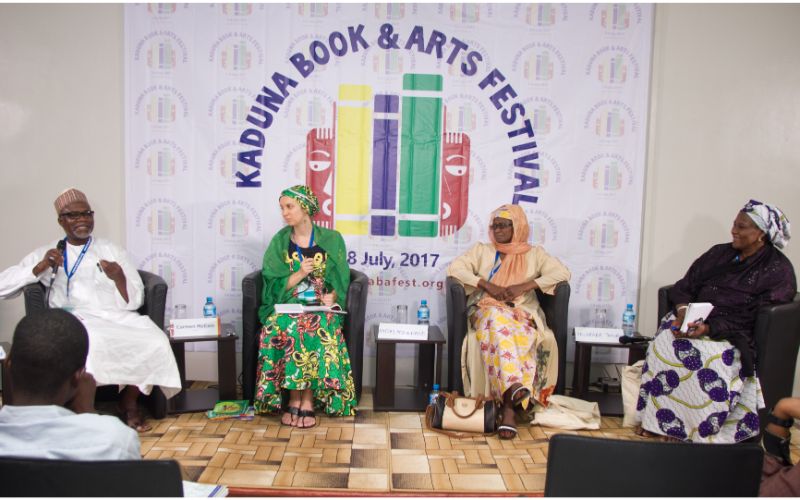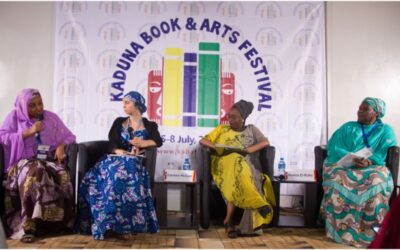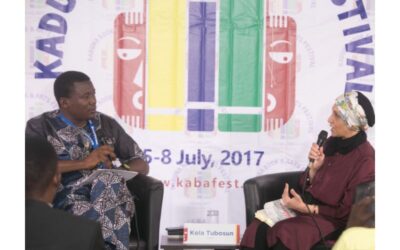HAUSA A FADAR TURAWA
Tun da aka fara bukin littattafai da zane-zane na farko a garin Kaduna, harshen Turanci kawai ke cikin karenshi ba babbaka. Hausa ko sai shiru ka ke ji. Amma a ranar alhamis, da aka tattaro goggan marubuta ta kasar Hausa sai kidin ya canza kuma rawan ma ya canza. Marubutan na mu su ne Auwalu Anwar, babban marubuci kuma dan siyasa wanda ya ke rubutu da turanci da kuma Hausa, sai Hafsat MA Abdulwahid, marubuciya mace ta farko da ta wallafa littafi, sai kuma Balaraba Ramat Yakubu, wadda ta na cikin marubuta Hausa kalilan da ka fassara littafin ta na Alhaki Kwikwiyo zuwa harshen Turanci. Carmen McCain ita ce ta jagori wannan tattaunawa.
Me yasa Marubutan mu suka fara rubutu da Hausa?
Hafsat Abdulwahid: Na fara rubutu da Hausa ne saboda babu makaranta rubutun turanci ba a wancan lokacin. Saboda haka nag a ya kamata in yi rubutu da turanci, kuma yanzu an fassara su har zuwa wasu harsuna ma kamar larabci.
Balaraba Yakubu: Na fara rubutu da Hausa ne saboda ban taba yin karatun book ba. Ba a sani a makaranta ba, saboda haka Hausa kawai na sani. Tun ina firamare ina yin rubuce rubuce na da wasa har wata rana aka sa gasa, na shiga, aka ce kuma na ci. Daga nan rubutu ya kankama, kuma littafina Budurwar Zuciya sai da aka ta tace shi har bugu shida kafin ya shiga kasuwa.
Auwalu Anwar: Na fara rubutu ne sanda na shiga wata gasa a makarantar sakandare ta GGC. Na karanta rubutuna na zamo na uku, mace ce kuma ta zama ta daya a wannan gasa. Daga nan sai na lura cewa zan iya fa rubutu da Hausan nan, ina sha’awar ta, kuma sai n ace duk abin da ya kamata na yi, zan yi na Hausa. Daga wannan kalubale ne na fara rubutu da Hausa.
Me ya rinjaye su suka rubuta littafan sun a farko?
Hafsat Abdulwahid: Akwai bukin ‘yar’uwa ta da aka yi, ita bafulatana ta auri balarabe, aka dai samu kalubale sosai. Saboda haka sai na dauki wannan labari na kara aljannu a kai domin ya yi armashi. Sai kuma hukumar NNPC ta sa gasa, na shiga na kumo fito zakara. Tun daga lokacin kuma ban aje rubutu ba.
Auwalu Anwar:Wakokin siyasa musamman na NEPU da NPC, da kuma a jamhuriya ta biyu a lokacin ina jami’a, wakokin su Mudi Sipikin, Sa’adu Zungur da su Gambo Sawaba duk suna cikin wakokin da ni ke so, kuma sun fi tasiri a kai na, a wajen rubutu.
Menene Alakar Marubuta da Masu Mulki?
Hafsat Abdulwahid: Na yi takarar Gwamna amma dalili ne ya kawo haka. Akwai wata yarinya da aka zarge ta da ta yi cikin shege kuma aka yanke mata bulala dari biyu idan ta haihu. A ka tambayi Gwamna Yarima me ya sa mata ba su a cikin kabinet din shi, ya ce ai matan Zamfara bas u da ilimin da za su rike mulki. Dalilin wannan ya sa na ce ni Gwamna ma zan fito.
Balaraba Yakubu: Cikin mu daya da marigayi Shugaban kasa Murtala, mahaifiyar mu daya. Shi mahaifin shi ya sa shi a makaranta, amma ni mahaifina bai sa ni ba. Wannan shi ya sa na ke jaddadawa wa mata su nemi ilimi, domin rage ma kan su bakin ciki.
Dan tsokacin namu kenan daga wannan taro tilo wanda ya baje kolin marubuta Hausawa, kuma ya jaddada cewa a bukukuwan adabi masu zuwa, dole ne a ba zama da tattaunawa da harshen Hausa muhimmanci.
Daga Sada Malumfashi
ENGLISH TRANSLATION
HAUSA IN A PALACE OF ENGLISH
Since the start of the inaugural Kaduna Book and Arts Festival (KABAFEST) English as a language was having a field day. Hausa was basically on the sidelines. However, on Thursday, the second day of the festival, when the most prominent Hausa writers assembled, the tune of the music and the dance changed. The writers were Auwalu Anwar, a prominent writer and a politician who writes bilingually in English and Hausa, then Hafsat MA Abduwahid, the first female writer to be published from the North, and finally Balaraba Ramat Yakubu, one of the few Hausa writers to have her novel, Alhaki Kwikwiyo Ne – Sin Is A Puppy – translated into English. Carmen McCain lead the discussion.
Why did the panelists begin writing in Hausa?
Hafsat Abdulwahid: I began writing in Hausa because there were not enough readers of English literature at that time. That is why I decided to instead write in Hausa, and now my works have been translated into other languages.
Balaraba Yakubu: I started writing in Hausa because I was never opportune to attend a formal western school. I never had any formal education; as such I only knew the Hausa language. Right from when I was young, I scribbled my writings informally, until one day a competition was set up, I entered and I was declared the winner. From then on I began writing consistently, and my novel Budurwar Zuciya – Young at Heart – went through copy-editing six times before it was released to the market.
Auwalu Anwar: I began writing when I when for a competition at a Government Girls College (GGC). I read my work on a stage and I emerged third best, and it was a lady that beat me to the first position in this competition. From then on, I realsied I could actually be a writer in Hausa, I loved it, and I decided whatever I was going to work on, I will do it in Hausa. It was from this challenge I set for myself that I began writing in Hausa.
What influenced the panelists to write their first books?
Hafsat Abdulwahid: There was my sister’s wedding back then, we are Fulani, but she married an Arab, and there were lots of challenges. After that, I wrote about that incident, and added jinni and spirits to make it more exciting. Incidentally, the Northern Nigerian Publishing Company (NNPC) initiated a writing competition that I entered and emerged victorious. From then on, I never stopped writing.
Auwalu Anwar: It was from political songs, especially of the Northern Elements Progressive Union (NEPU) and the Northern People’s Congress (NPC) that I was influenced. Then in the second republic, while I was in University, I was in love with the songs of Mudi Sipikin, Sa’adu Zungur and Gambo Sawaba. They had a lot of influence on me personally and also influenced my writings.
What is the relationship between writers and the government?
Hafsat Abdulwahid: I once contested for a governorship election, but it was for a reason. There was a young girl that was accused of getting pregnant out of wedlock and was sentenced to be flogged 200 lashes after delivering. The then Governor of Zamfara State, Ahmad Yarima was contacted on the issue and why there were not any females on his cabinet, and he replied that women in Zamfara do not have the requisite education to hold a political office. That was why I decided that I am going to even contest for the Governorship position.
Balaraba Yakubu: I came from the same womb with the former Head of State, Late Muratala Ramat. We had the same mother, but different fathers. His father enrolled him in school, while my father did not. This is the reason why I always emphasise that women should be educated, so that they will reduce the burdens on them.
*
This is our little excerpt form this once in a lifetime fair of Hausa writers, which re-emphasised the need for inclusion of more panel discussions in Hausa in future book festivals.
Written and Translated by Sada Malumfashi



Comments are closed.